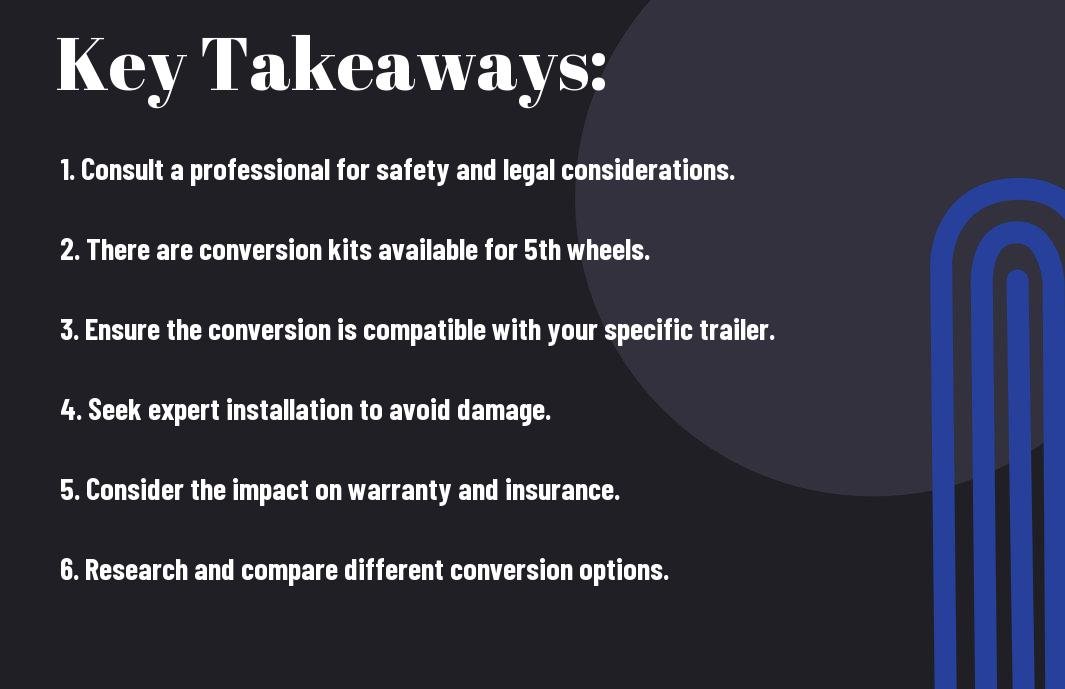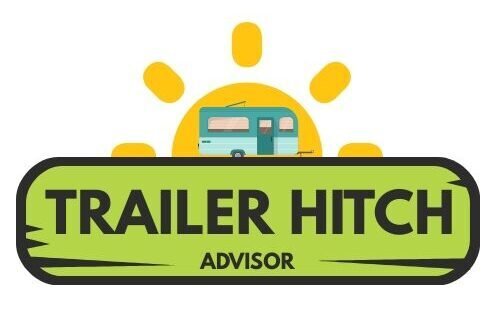Converting your 5th wheel to a gooseneck can be a great way to upgrade your towing setup, but it’s important to understand the process and potential challenges involved. While it is possible to convert your 5th wheel to a gooseneck, it’s crucial to ensure that the conversion is done properly to avoid compromising safety on the road. The most important detail to consider is that converting to a gooseneck may void your manufacturer’s warranty on the 5th wheel, so it’s essential to weigh the benefits against the potential drawbacks. Additionally, it’s crucial to consult with a professional to ensure that the conversion will not affect the structural integrity of your 5th wheel, as this can lead to serious safety issues while towing. Before making any changes, be sure to thoroughly research the process and consult with a qualified expert to make an informed decision about converting your 5th wheel to a gooseneck.
Key Takeaways:
- Not all 5th wheels can be converted to gooseneck: Some models are not designed to accommodate a gooseneck hitch, so it’s important to consult with a professional to determine if it’s possible for your specific 5th wheel.
- Consult a professional: It’s crucial to seek the expertise of a professional to ensure that the conversion is done properly and safely.
- Consider the warranty implications: Converting your 5th wheel to a gooseneck may void the manufacturer’s warranty, so it’s important to weigh the pros and cons before proceeding.
- Ensure proper weight distribution: Proper weight distribution is crucial for safe towing, so it’s essential to ensure that the conversion is done in a way that maintains proper weight distribution.
- Proper installation is key: The conversion process requires precise installation to ensure that the hitch is secure and able to handle the weight of the trailer.
- Check local regulations: Before converting your 5th wheel to a gooseneck, it’s important to check local regulations to ensure that it complies with any specific requirements in your area.
- Consider the cost: Converting a 5th wheel to a gooseneck can be a significant investment, so it’s important to consider the cost before making a decision.

Assessing Compatibility
While converting your 5th wheel to a gooseneck can offer some benefits, it’s important to first assess the compatibility of your trailer and vehicle. This will ensure that the conversion is safe and effective, and that your vehicle can handle the load.
Structural Considerations
When considering a conversion, you’ll need to assess the structural integrity of your 5th wheel trailer. The gooseneck hitch will place different weight and stress on the trailer’s frame, so it’s crucial to ensure that the frame is able to handle the additional load. Make sure that the frame is reinforced and that it can withstand the new hitching mechanism. Additionally, consider having a professional inspect the trailer to ensure that it is safe to convert to a gooseneck hitch.
Vehicle Requirements
Converting to a gooseneck hitch also requires assessing your vehicle’s towing capacity and compatibility. Your vehicle needs to be equipped to handle the load of the gooseneck trailer, especially if you plan to tow heavy loads. Check the manufacturer’s specifications for your vehicle to determine its towing capacity and ensure that it meets the requirements for the converted 5th wheel. Upgrading your vehicle’s suspension and braking system may be necessary to handle the increased load and provide a safe towing experience.
By assessing these structural and vehicle requirements, you can ensure that your 5th wheel is compatible with a gooseneck hitch and that it can be safely converted. It’s important to address any potential issues before proceeding with the conversion to prevent any dangerous situations on the road. Remember to consult with a professional to inspect your trailer and ensure that the conversion is feasible for your specific setup. Ensuring compatibility will keep you and others safe while towing with a gooseneck hitch.
Conversion Process
Keep in mind that converting a 5th wheel trailer to gooseneck involves more than just swapping out the hitch. It’s a process that requires careful consideration and attention to detail to ensure a safe and successful conversion.
Choosing the Right Adapter
When it comes to converting your 5th wheel to a gooseneck, choosing the right adapter is crucial. You’ll need to select an adapter that is compatible with your specific trailer and towing vehicle. Make sure to take into account the weight rating of the adapter to ensure it can safely handle the load of your trailer.
Step-by-Step Conversion Guide
When converting your 5th wheel to a gooseneck, it’s important to follow a step-by-step process to ensure everything is done correctly. Below is a guide to help you through the conversion process:
Step
Details
1. Remove the 5th wheel hitch
2. Install the gooseneck hitch in the truck bed
3. Attach the adapter to the trailer frame
4. Test the connection for stability and safety
By following these steps, you can ensure a smooth and safe conversion from a 5th wheel to a gooseneck.
Legal and Safety Implications
For anyone considering converting their 5th wheel to a gooseneck hitch, it’s crucial to be aware of the legal and safety implications involved in this modification. By making this change, you will need to ensure that you are compliant with road regulations and that you are taking all necessary precautions to ensure safe towing post-conversion.
Road Regulations and Compliance
When you convert your 5th wheel to a gooseneck, it’s important to be aware of the road regulations and compliance requirements in your state or region. Some areas have specific guidelines and restrictions in place for towing vehicles with gooseneck hitches. It’s your responsibility to ensure that your vehicle and trailer meet these requirements to avoid any legal issues or penalties.
Ensuring Safe Towing Post-Conversion
Converting your 5th wheel to a gooseneck can impact the safety and stability of your towing setup. It’s essential to take the necessary steps to ensure that your vehicle and trailer are still safe to tow post-conversion. This includes making sure that the gooseneck hitch is installed properly and that your trailer is balanced and secure. You also need to consider the potential impact on braking and maneuverability, and make any necessary adjustments to maintain safe towing capabilities.
Maintenance and Troubleshooting
To ensure a successful conversion of your 5th wheel to a gooseneck hitch, it is crucial to perform regular maintenance checks and be familiar with common issues and their solutions.
Routine Maintenance Checks
Regularly inspecting and maintaining the gooseneck hitch on your 5th wheel is essential for safe and efficient towing. You should inspect the hitch, safety chains, and wiring connections before each trip. Additionally, lubricate the hitch as per manufacturer recommendations to ensure proper functionality and prevent wear and tear. Inspecting and maintaining your hitch will not only extend its lifespan but also ensure your safety and the safety of others on the road.
Common Issues and Solutions
One of the most common issues with a gooseneck hitch is a loose connection. You should regularly check the bolts and make sure they are tightened to the manufacturer’s specifications. Additionally, be mindful of any unusual sounds or movement from the hitch during towing, as these could be indicators of a problem. If you encounter any issues, such as excessive wear or damage, it is crucial to address them immediately to prevent further damage and ensure the safety of your towing experience. Remember to always consult a professional if you are unsure about any issues you encounter with your gooseneck hitch.
Can I convert my 5th wheel to gooseneck?
With these considerations in mind, you can certainly convert your 5th wheel to a gooseneck hitch. However, it is important to consult with a professional to ensure that the conversion is done safely and effectively. By addressing any potential structural modifications and choosing the appropriate hitch, you can successfully convert your 5th wheel to a gooseneck for a smoother towing experience. Remember to also consider any legal implications and warranty issues that may arise from the conversion. Ultimately, with the right expertise and attention to detail, you can make the switch from a 5th wheel to a gooseneck hitch.
FAQ
Q: Can I convert my 5th wheel to gooseneck?
A: Yes, it is possible to convert your 5th wheel to a gooseneck. There are conversion kits available that allow for this modification, but it is important to ensure that the conversion is done properly to maintain the safety and integrity of your trailer.
Q: Is it legal to convert a 5th wheel to gooseneck?
A: The legality of converting a 5th wheel to a gooseneck varies by state and jurisdiction. It is important to check the regulations in your area before making any modifications to ensure compliance with the law.
Q: What are the benefits of converting a 5th wheel to gooseneck?
A: Converting a 5th wheel to a gooseneck can provide improved maneuverability and stability while towing. It can also allow for a tighter turning radius, making it easier to navigate tight spaces. Additionally, gooseneck hitches are often more readily available and may be easier to hook up than traditional 5th wheel hitches.
Q: Can I do the conversion myself or do I need a professional?
A: While it is possible for experienced individuals to perform the conversion themselves, it is highly recommended to have the conversion done by a professional who has expertise in this specific type of modification. This will help ensure that the conversion is done correctly and safely.
Q: Are there any downsides to converting a 5th wheel to gooseneck?
A: One potential downside of converting a 5th wheel to a gooseneck is that it may void the warranty on your trailer. Additionally, if not done properly, the conversion could compromise the structural integrity and safety of the trailer. It is important to carefully consider these factors before proceeding with the conversion.
